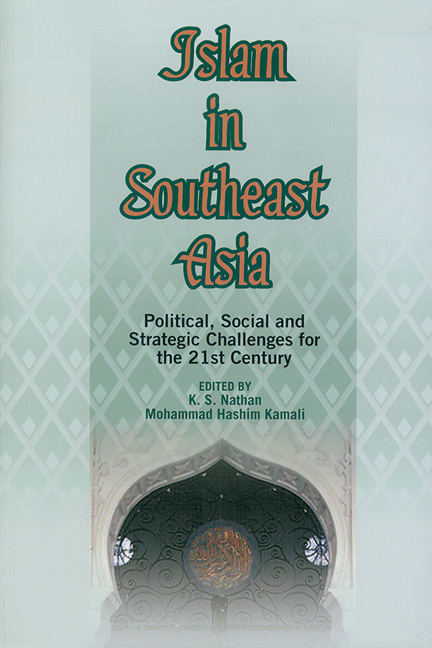Book contents
- Frontmatter
- Contents
- Preface
- Introduction: Understanding Political Islam Post-September 11
- PART ONE ISLAMIC DOCTRINE, HISTORY, GROWTH AND INSTITUTIONS IN SOUTHEAST ASIA
- PART TWO POLITICS, GOVERNANCE, CIVIL SOCIETY AND GENDER ISSUES IN SOUTHEAST ASIAN ISLAM
- 6 Islam Embedded: ‘Moderate’ Political Islam and Governance in the Malay World
- 7 Law-Making in the Name of Islam: Implications for Democratic Governance
- 8 Is It Always Islam versus Civil Society?
- 9 Islamization, Civil Society and Religious Minorities in Malaysia
- 10 Islam and Gender: Reading Equality and Patriarchy
- PART THREE MODERNIZATION, GLOBALIZATION AND THE ‘ISLAMIC STATE’ DEBATE IN SOUTHEAST ASIA
- PART FOUR IMPACT OF SEPTEMBER 11 ON ISLAMIC THOUGHT AND PRACTICE
- CONCLUSION: Addressing the Challenge of Political Islam in Southeast Asia
- Note on Contributors
- About the Editors
- Index
10 - Islam and Gender: Reading Equality and Patriarchy
from PART TWO - POLITICS, GOVERNANCE, CIVIL SOCIETY AND GENDER ISSUES IN SOUTHEAST ASIAN ISLAM
Published online by Cambridge University Press: 03 November 2017
- Frontmatter
- Contents
- Preface
- Introduction: Understanding Political Islam Post-September 11
- PART ONE ISLAMIC DOCTRINE, HISTORY, GROWTH AND INSTITUTIONS IN SOUTHEAST ASIA
- PART TWO POLITICS, GOVERNANCE, CIVIL SOCIETY AND GENDER ISSUES IN SOUTHEAST ASIAN ISLAM
- 6 Islam Embedded: ‘Moderate’ Political Islam and Governance in the Malay World
- 7 Law-Making in the Name of Islam: Implications for Democratic Governance
- 8 Is It Always Islam versus Civil Society?
- 9 Islamization, Civil Society and Religious Minorities in Malaysia
- 10 Islam and Gender: Reading Equality and Patriarchy
- PART THREE MODERNIZATION, GLOBALIZATION AND THE ‘ISLAMIC STATE’ DEBATE IN SOUTHEAST ASIA
- PART FOUR IMPACT OF SEPTEMBER 11 ON ISLAMIC THOUGHT AND PRACTICE
- CONCLUSION: Addressing the Challenge of Political Islam in Southeast Asia
- Note on Contributors
- About the Editors
- Index
Summary
“Women have always been the best friends of religion, but religion has generally not been a friend of women.” (Moriz Winternitz, a German Indologist)
INTRODUCTION
The above remark is cited by Annemarie Schimmel in her foreword to The Tao of Islam (Murata 1992, vii). Winternitz's observation is particularly evident when put in the context of Islam, as Schimmel contends that “it is certainly easier to look only at the surface … of polygamy and easy divorce and … purdah … than to try to see the more positive sides of Islam”. Muslims have been exposed with various gender-biased discourses and stereotypes, such as women not having equal rights as men or not allowed to be involved in their own religious matters, that negative images of Islam will more immediately capture people's attention than otherwise when talking about Islam and women.
WOMEN IN PRE-ISLAMIC ARABIAN PENINSULA
Two verses which can be cited to explain the mission of God in revealing the Qur'an and in creating human beings are Surah al-Anbiya’ (21:107). “We sent thee not, but as a mercy for all creatures”, and Surah al-Hujurat (49:13) “O mankind! We created you from a single (pair) of a male and female, and made you into nations and tribes, that you may know each other (not that you may despise each other). Verily the most honoured of you in the sight of Allah is (one who is) the most righteous of you.”
To appropriately understand the Qur'an's treatment of women and gender, and therefore to appreciate its revolutionary breakthrough for women's liberation and empowerment, it is important that one observe the sociocultural and historical context of its revelation. The reason is obvious, as noted by Engineer (1992, p. 20), that “no revolution, political or religious (and Islam was indeed a socio-religious revolution), can remove all traces of the past”. Continuity is always there and it is this continuity which maintains relationship with the past. A total breaking from the past, however hard it is attempted, may not be possible. Similarly, the history of Islam also reveals that whatever was reformed or prohibited by the Prophet Muhammad that prevailed during the period of jahiliyya (ignorance) in the advent of Islam, crept back into Islamic shari'a through adat (that is, pre-Islamic traditional practices).
- Type
- Chapter
- Information
- Islam in Southeast AsiaPolitical, Social and Strategic Challenges for the 21st Century, pp. 191 - 206Publisher: ISEAS–Yusof Ishak InstitutePrint publication year: 2005



